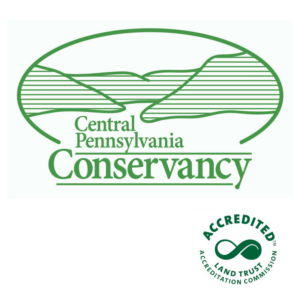 On August 7, the Land Trust Accreditation Commission, a program promoting national quality standards for ensuring permanence in the conservation of American lands, announced more than 400 land trusts have now earned the national accreditation mark of distinction. This new total came as 39 land trusts across the country were recognized for having completed the rigorous process to achieve first-time or renewed accreditation. The Central Pennsylvania Conservancy was among the land trusts that achieved first-time accreditation.
On August 7, the Land Trust Accreditation Commission, a program promoting national quality standards for ensuring permanence in the conservation of American lands, announced more than 400 land trusts have now earned the national accreditation mark of distinction. This new total came as 39 land trusts across the country were recognized for having completed the rigorous process to achieve first-time or renewed accreditation. The Central Pennsylvania Conservancy was among the land trusts that achieved first-time accreditation.
“Passing the 400 mark for accredited land trusts is significant,” said Tammara Van Ryn, executive director of the Commission. “There are now almost as many accredited land trusts are there are national parks, monuments, and historic sites. By earning this distinction, these land trusts have proven they can effectively steward the nearly 20 million acres of land under their care.” Accredited groups protect more than land for the benefit of their communities than the size of Denali, Yellowstone, Grand Canyon, Glacier, Everglades and Yosemite national parks combined.
The accreditation seal awarded by the Commission indicates these groups demonstrate sound finances, ethical conduct, responsible governance and lasting stewardship of the lands they protect. The Commission is an independent program of the Land Trust Alliance, a national land conservation organization working to save the places people need and love by strengthening land conservation across America.
“That so many land trusts are interested first in pursuing and later renewing their accreditation is a testament to the value of this process,” said Andrew Bowman, the Alliance’s president. “Accreditation verifies that land trusts are compliant with Land Trust Standards and Practices, the ethical and technical guidelines for the responsible operation of a land trust. I’m not surprised the conservation community has reached this milestone, but I certainly am pleased.”
Accredited land trusts must renew every five years, confirming their compliance with national quality standards and providing continued assurance to donors and landowners of their commitment to forever care for their land and easements.
The 17 land trusts achieving first-time accreditation were Bear-Paw Regional Greenways (New Hampshire), Cazenovia Preservation Foundation (New York), Central Pennsylvania Conservancy (Pennsylvania), Fallbrook Land Conservancy (California), Geneva Lake Conservancy (Wisconsin), Kennebec Land Trust (Maine), Land Trust of the Treasure Valley (Idaho), Lord Berkeley Conservation Trust (South Carolina), Lower Shore Land Trust (Maryland), Madison Audubon Society (Wisconsin), Mother Lode Land Trust (California), Putnam County Land Trust – Save Open Spaces (New York), Raritan Headwaters Association (New Jersey), South Jersey Land and Water Trust (New Jersey), The Prairie Enthusiasts and its affiliate TPE Trust (Wisconsin), Upper Peninsula Land Conservancy (Michigan), and Winchester Land Trust (Connecticut).
The 22 land trusts achieving renewed accreditation were Bainbridge Island Land Trust (Washington), Big Sur Land Trust (California), Blue Hill Heritage Trust (Maine), Blue Ridge Conservancy (North Carolina), Bluegrass Land Conservancy (Kentucky), Chelan-Douglas Land Trust (Washington), Douglas Land Conservancy (Colorado), Genesee Land Trust (New York), Green Spaces Alliance of South Texas, Hill Country Land Trust (Texas), Land Trust of North Alabama, Lowcountry Land Trust (South Carolina), Mahoosuc Land Trust (Maine), Mount Grace Land Conservation Trust (Massachusetts), New Jersey Conservation Foundation, Openlands (Illinois), San Joaquin River Parkway and Conservation Trust (California), Southeast Land Trust of New Hampshire, Southern Oregon Land Conservancy, Spartanburg Area Conservancy (South Carolina), Sudbury Valley Trustees (Massachusetts), and Truckee Donner Land Trust (California).






